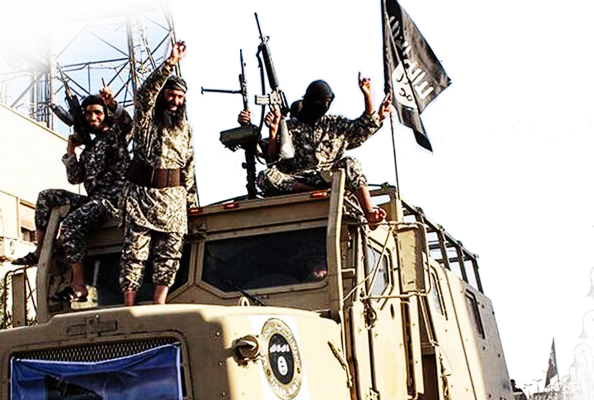ISIS has explicit aspirations for global domination, but it has specifically set its sights on Israel and Jerusalem. This report lists the ways ISIS can threaten Israel.
The Islamic State (IS or ISIS) terror group is part of the larger picture of the establishment of global jihad organizations, and as such poses a threat to the entire West.
ISIS, which operates out of Iraq and Syria, shares a border with Israel, and has fixed its sights specifically on Israel, vowing to fly its flag in Jerusalem.”The flag of the Caliphate will rise over Baytul-Maqdis (Jerusalem) and Rome, even if the Jews and Crusaders despise such,” ISIS clearly stated in its magazine Dabiq.
A report compiled by the Intelligence and Terror Information Center (ITIC), an Israeli-based research group with close ties to the Israel Defense Forces, identified the following ways in which ISIS threatens Israel, Israelis and Jews abroad:
Active Terrorist Fronts on Israel’s Borders
The Syrian Golan Heights are controlled by rebel organizations, the most prominent of which is the Al-Nusra Front, Al-Qaeda’s branch in Syria. While ISIS does not currently have a significant presence there, ITIC points out that the dynamics can easily change the Golan Heights from a relatively quiet area to a battle zone.
The border with Syria has been the most peaceful border for years. However, a senior IDF officer serving in the Golan Heights told correspondents 95% of the border between Israel and Syria is controlled by various Muslim rebel groups, and the situation could deteriorate quickly.
In the Sinai Peninsula, the Ansar Bayt al-Maqdis terror organization, which has recently pledged allegiance to ISIS, can launch terrorist attacks against Israel and may have already done so.
ISIS Threat to Israel by Proxy
ISIS is a terrorist organization with semi-state capabilities, ITIC notes.
It has advanced weapons and technology captured from the Iraqi and Syrian armies, much of it supplied by the U.S. government.
It earns enormous amounts of money from oil fields, kidnappings and other resources.
It enlists foreign fighters, and it has an advanced media network which promotes ISIS’ aspirations for global domination.
These capabilities may be used for jihadi terror organizations and networks in the Middle East, including countries and entities bordering Israel, such as Jordan. Reports coming out of the Gaza Strip indicate that ISIS enjoys popularity and influence over the residents of Gaza.
Attacks Against Jews in Israel and Abroad
The ITIC warns that because of the American campaign against ISIS, and the competition between jihadi organizations such as global Al-Qaeda, ISIS may encourage or initiate attacks within Israel from inside the country or from its borders, or against Israeli and Jewish targets abroad.
They may enlist the support of veterans of the fighting in Syria and Iraq who have returned to their countries of origin or from local operatives and networks that support ISIS, and may further use this capability against the local population as well.
U.S.-Iran Cooperation Hinders Israel’s Security Interests
Despite Iran’s basic hostility towards the U.S. and despite Iran’s subversion of American interests in the Middle East, it might collaborate with the United States against ISIS and global jihad in Syria and Iraq, the common enemy.
Such collaboration might occur at Israel’s expense and harm its vital interests. For example, U.S. may ease the sanctions against Iran on the nuclear issue in order to gain diplomatic traction.
In addition, collaborating against ISIS might increase Iranian influence in Syria and Iraq, and might also strengthen Hezbollah’s status in Lebanon, possibly strengthening the Iranian-led radical camp in the Middle East.
“There are potential dangers both to the West and to Israel in regional politics caused by the subversive potential of the increasing strength of Al-Qaeda and the global jihad in Syria and Iraq,” the ITIC report concludes. “The influence of a strong Al-Qaeda and global jihad in those countries might filter into the entire Arab world, including pro-Western countries such as Jordan and Saudi Arabia, which so far have shown themselves strong enough to survive the regional upheaval,” ITIC warns. “It might also give more power to the global jihad organizations and networks in countries peripheral to the center of the Middle East which have failed regimes, such as Libya and Yemen, or weak regimes, such as Tunisia.”
You Can Fight Back Against Iran!
The discussions between Iran and the West regarding Iran’s nuclear aspirations are at a crucial point. Israel fears that the Obama Administration will ease the sanctions on Iran to gain diplomatic points. We MUST ensure that Iran does not become nuclear. To sign a petition demanding that sanctions NOT be eased on Iran at Israel’s expense click HERE.
Author: United with Israel Staff
(With files form ITIC)
